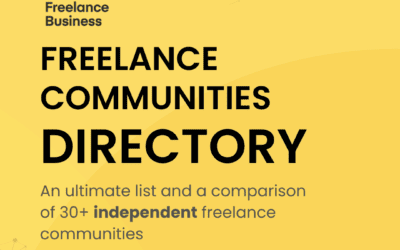Are you lost between the different notions about the future of work?
Don’t despair, that’s why organisations like ours exist, to help you navigate through the plethora of terms and definitions!
With the help of the digital sourcing platform Gigged.ai, we will take a look at what the various terms mean in the future of work (which is increasingly becoming the present for all of us) and explain it in plain language. Please note that it’s not a full directory, just the most essential terms you need to know to have more clarity about what the industry are heading for.
Blended workforce
A mix of permanent workforce (employees), flexible workforce (freelancers) and technology (software), with the aim of finding out how they can work together to form a powerful team. Learn more from Szilvia’s article with practical tips for freelancers in the future of work.
Consultant
A consultant is a professional who provides advice and other purposeful activities in an area of specialisation. Consultants can work for companies or individuals, as an independent professional or owner of a company, or as an employee of a local or international consultancy firm.
Contingent Worker
A professional who works with companies on a project / temporary basis, for a certain fee for their services, sometimes on an hourly basis. A very similar, almost identical term is Contractor, Freelancer, Interim Manager or Independent Professional.
Contractor
A professional or company that carries out an assignment under the terms of a contract. This can be intellectual work, but also physical work (e.g. electrical installation). They usually work for one client at a time, full-time or for the length of a project, and typically work at the clients’ office. For more information, read our short glossary on the different types of self-employment you can practise.
Contract Management
A software or a process that helps to manage contracts made with customers, vendors, partners, or employees.
Collective
According to Medium.com, collective freelancing is a way for freelancers to work as a team without the constraints of a company structure. In comparison to solo freelancing, these teams can tackle larger contracts (with bigger payoffs) and better leverage individual skills.
Coworking
An office where several people can work independently in the same space, get to know each other at work and exchange experiences. It’s similar to a regular office environment, but here the coworkers are not colleagues but independent professionals or employees of a company who can work from anywhere. In the coworking offices, anyone can rent a workstation that is available for an hourly rate or with a daily or monthly pass.
Digital Nomads
Location independent workers who are constantly on the move, travelling frequently and working from all over the world. Relatively few of them travel on a lifelong basis, for years or decades. The majority travel for 1–2 years at most, changing location every 3–6 months. But the most common – and they don’t consider themselves nomads – are those who occasionally (e.g. every 2–3 years) take a trip and go away for 1–6 months. Or they’re stargazing around the world, travelling several times a year for 2–4 weeks, working in between, but they have a fixed base that they return to and spend most of their time there. Sounds tempting? Read our 7 steps guide for freelancers who want to become digital nomads.
Digital Sourcing Platform
A platform that helps companies in finding and qualifying freelance or full time talents using technology to streamline the process. In addition to running the platform, there is a strong emphasis on the active involvement in the selection process.
Flexible workforce
A workforce that works for a company in a flexible way, other than the traditional 9 to 5. From a company’s point of view, this is about workers who are available quickly, who can work on temporary assignments and who can adapt flexibly to the tasks that arise.
Fractional work / Fractionals / Fractional hire
Fractional hire combines consulting and freelancing, and usually for senior positions and long-term assignments. Freelancers can be hired for a fractional role. Or this position can be open for a fixed part-time hire. Great explanation here.
Freelancer
Highly skilled professionals who sell their expertise on a project basis to multiple clients per year in a variety of fields. This typically includes marketing, media, IT and engineering services, graphic design, design, translation, interpreting, business consulting and coaching. They work on a flexible schedule, in a location of their choice, typically online. They usually only need a computer to complete their tasks. A.k.a. contractor or independent professional.
Freelancing
The way you work as a freelancer. Learn more from this article from Gigged.ai.
Freelance platform
Online platforms where clients and freelancers find each other for project-based / hourly collaborations. The freelance platforms typically deduct a commission from the service fee paid by the client to the freelancer, from which they ensure the smooth running of the platform (and generate a profit).
Freelancer marketplace
The same as a freelance platform.
Freelance Management System (FMS)
An online platform that facilitates all operational, financial and legal aspects of clients’ cooperation with freelancers, from application to payment.
Gig Worker
An independent worker who does work for a company’s clients. The term is typically used to describe work that technological developments have opened up, such as freelancing on online platforms (Upwork, Fiverr, etc.), or jobs provided by the rise of the sharing economy (Uber, Deliveroo, Etsy, etc.).
Independent Professional (iPros)
See at Freelancer.
Interim Manager
Interim manager is a highly experienced and specialised executive whom you can employ for a short time to solve a specific business problem.
Managed Service Provider (MSP)
A company that takes on primary responsibility for managing an organisation’s contingent workforce program. Typical responsibilities of an MSP include overall program management, reporting and tracking, supplier selection and management, order distribution and often consolidated billing. Many MSPs also provide their clients with a Vendor Management System (VMS). An MSP can also be responsible for the client’s direct sourcing and may or may not be independent of a staffing supplier.
On-Demand Workforce
See at Flexible Workforce.
Online work platform
See at Freelance Platform. Want to know more? Check the list of online work platforms for IT freelancers!
Open Innovation
According to Harvard Business School, open innovation is a strategy that suggests the best ideas, solutions, and people necessary to solve your organisation’s difficult problems may come from outside your company entirely. There are different types of open innovation – contests, crowdsourcing, collaborative communities and online labour markets – and the term includes the way to adopt and implement open innovation in an organisation.
Open Talent
Open Talent is the digital extension of outsourcing. It refers to the ‘crowd’ of global talent available outside a company’s internal hires. Hundreds of companies and platforms comprise this large ecosystem of “open-sourced” talent enabling people and organisations to find the best ideas at scale, tap the best expertise, and augment staffing as needed.
Open Talent Economy
According to Deloitte, a collaborative, technology-driven, rapid-cycle way of doing business.
Outsourcing
Outsourcing refers to a contractual arrangement wherein a company hires another company or an individual to take charge of a particular activity that is currently or could be performed in-house.
Payroll
Payroll for freelancers typically refers to the process of calculating and distributing payments to independent contractors, who are not considered employees of a company. Freelancers typically invoice their clients for services rendered and are responsible for tracking their own work hours and expenses. Overall, while the process of payroll for freelancers differs from that of traditional employees, it is still an important aspect of financial management for businesses that work with independent contractors.
Solopreneur
An individual who starts and runs a business independently and autonomously, without a co-founder or employees.
Side Gig / Side Hustle
A job that gives the employee extra income while working full-time. For more, read the “The Rise of the Side Gig” article.
Vendor Management System (VMS)
Vendor management system is a software that helps organisations to manage their contingent workforce. It includes the management of vendor relationships, the measurement of vendor performance, procurement, management of contingent workers sourced either through a staffing agency or another sourcing avenue.
Would you add anything else?
Seems like there are so many terms and definitions when it comes to describe freelance work, depending on who is using it. Good news: The Association for the Future of Work is working on producing a framework to create a global standard in what concerns terminology for freelance and flexible work.
They have identified four tiers:




